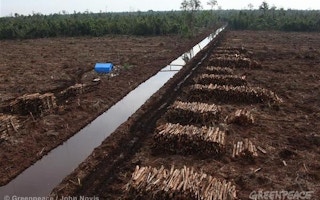Three international environmental organisations declared on Wednesday that leading pulp and paper manufacturer Asia Pacific Resources International Limited (APRIL) is evading an enquiry into its deforestation practices.
The World Wildlife Fund (WWF), Greenpeace and the Rainforest Action Network (RAN) pointed out that the Indonesian industry giant’s withdrawal from the Forest Stewardship Council (FSC) certification scheme last June 22 is a sign of avoidance, and an indication of its dodgy forest operations.
FSC is a global group promoting the proper management of forests around the world and its certificates, known as the Chain of Custody (CoC) certification, allow companies to put an eco-label on their products to alert customers of compliance to sustainable policies.
Recently, the sustainability and ethical management of forests have been put under the international spotlight due to the record-breaking air pollution that affected Singapore and Malaysia. The haze was reportedly caused by smoke coming from forest fires in Indonesia’s Riau province, where there are several timber plantations for pulp, paper and palm oil productions.
According to the environmental NGOs, APRIL has continuously committed large-scale conversions of natural forests, including those classified as high conservation value (HCV) forests, in Indonesia to create its plantations. This is a clear violation of FSC’s Policy for Association, they said.
The FSC Policy for Association upholds the type of companies that the group connects with. Associated companies must follow the fundamental principles of responsible forest management and companies holding CoC certificates must not be involved in the conversion of HCV forest. Also, they must not have converted a forest area that is more than 10,000 hectares within the past five years.
Aditya Bayunanda, WWF Indonesia’s Global Forest and Trade Network (GFTN) and pulp paper manager, revealed, “Between 2007 and 2012, APRIL and its suppliers in Riau have converted close to 200,000 hectares of Sumatra’s rainforests to plantations. Much of that was vital forest habitat for critically endangered Sumatran elephants and tigers.”
WWF, RAN and Greenpeace have thus filed an earlier complaint with the FSC because of the violation and other social malpractices.
APRIL, for its part, reasoned in a statement that it was seeking a withdrawal due to “concerns about the FSC’s Policy for Association.”
The pulp and paper company, a 2008 United Nations Environment Programme Champions of the Earth, is also certified by the Programme for Endorsement of Forest Certification (PEFC), another organisation for sustainable forest management with an umbrella network of third-party certifications.
According to the three NGOs they could not file a complaint to the PEFC since it does not have any Policy of Association.
Bayunada said, “By quitting the FSC, APRIL is avoiding independent scrutiny of its operations as presented in the NGO’s formal complaint to the FSC. It is effectively admitting its deforestation practices are incompatible with the FSC.”
Lafcadio Cortesi, a representative from RAN, added, “By walking away from the FSC, APRIL is sending a clear signal to the market that it has no intention of stopping its destructive operations. Contrary claims by APRIL are no more than greenwash.”
Greenpeace said it is calling on companies buying from APRIL to cancel their contracts until the manufacturer corrects its practices.
Together with WWF and RAN, they request that APRIL immediately stop all natural forest clearance, whether in their own plantations or their suppliers’, and adhere to a comprehensive zero deforestation policy.

















